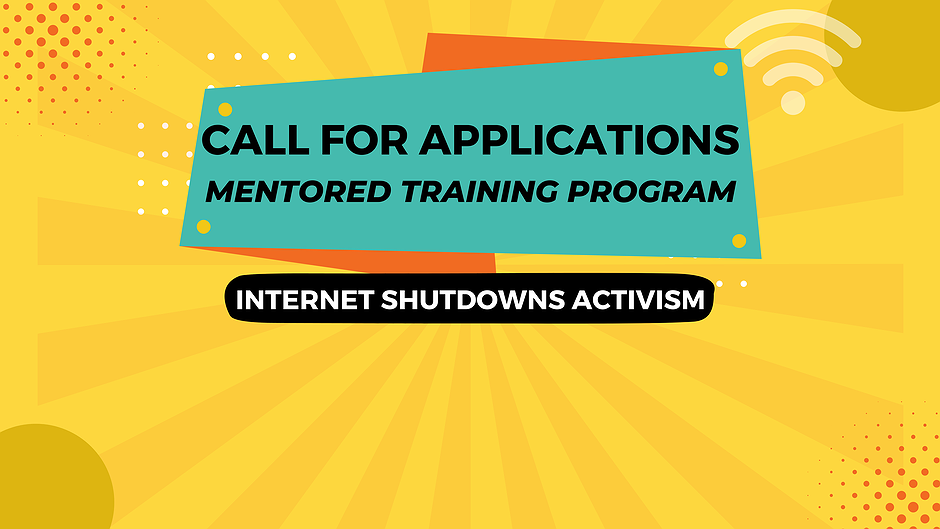
Internet Shutdown Mentored Training Program
Every year, millions of people worldwide suffer the consequences of internet shutdowns, severely impacting their ability to exercise fundamental rights and participate actively in societies, economies, and democracies. These shutdowns often occur without warning, forcing us to quickly react during moments of crisis or political uncertainty when communications are curtailed. In order to build advocacy capacity to prepare for and respond to internet shutdowns before they occur, Advocacy Assembly presents the mentored training program. This six-week online initiative aims to equip participants with the knowledge, skills, and resources necessary to prepare better and build an internet shutdown advocacy campaign. In order to take part in the mentored training program, you need to complete an application. Please note the following:
- Applications deadline is July 15, 2023, but applications will be accepted on a rolling basis so we encourage application submissions before this deadline.
- The program runs from August - October 2023.
- Participants will then have four months, from October 2023 to February 2024, to implement funded activities.
Unlocking the Potential of Advocacy
The mentored training program is designed as an opportunity for individuals in at-risk countries who aspire to become champions in the fight against internet shutdowns. Through engaging with international experts, fellows will gain valuable insights into developing multi-stakeholder coalitions and executing responsive campaigns. The program adopts a flexible, online learning format, allowing participants to access course materials at their convenience. Moreover, one-on-one conversations will enable fellows to receive personalized guidance as they build comprehensive action plans tailored to their communities' needs.
Empowering through Knowledge
During the mentored training program, participants will delve into a range of critical topics. From documenting human rights violations during shutdowns to utilizing tools like OONI and IODA to measure the impact of shutdowns, fellows will acquire invaluable skills. They will also learn to develop risk assessments and action plans, engage with the private sector, understand strategic litigation against shutdowns, explore circumvention methods for censorship, and build effective advocacy campaigns. This knowledge will empower fellows to respond strategically and proactively to internet shutdowns.
Transforming Ideas into Action
Upon completion of the program, fellows will have the opportunity to access funds to implement activities outlined in their action plans. This financial support could enable them to organize trainings for their communities, design awareness campaigns, develop legal strategies, localize circumvention tool resources, or collaborate with journalists to report on internet shutdowns. By empowering fellows to translate knowledge into tangible actions, the program aims to foster real change and resilience in the face of internet shutdowns.
Join the Movement
Don't miss your chance to be part of the mentored training program. The application process is simple—just fill out the form. The deadline for applications is July 15, 2023, and applications will be reviewed on a rolling basis. The program itself will run from August to October 2023, followed by four months for fellows to implement funded activities. The Advocacy Assembly's mentored training program offers a unique opportunity to combat internet shutdowns head-on. By equipping individuals with the necessary tools, knowledge, and financial support, this program enables participants to become change-makers in their communities. Join the fight against internet shutdowns and be a catalyst for positive change.
Apply today and make a difference! For any further inquiries, please contact Laura Schwartz-Henderson at [email protected].
Related courses

90 mins
 School of Data
School of Data
90 mins
 School of Data
School of Data Rory Peck Trust
Rory Peck Trust
50 mins
 Rory Peck Trust
Rory Peck Trust
Blogs

6 useful resources for journalists covering Covid-19
With a global pandemic spreading throughout the world, journalists are under increasing pressure to report accurate and relevant news for the masses. Often when covering a crisis, those on the reporting frontlines compromise their physical safety and mental health. To show some solidarity, the Advocacy Assembly team curated a list of useful resources from other organisations leading the way on this.

5 ways to find data for your next story
Data journalism is fast becoming a big trend in newsrooms across the globe. However, data isn’t always so easy to find. Here are five ways to get data for your next article.



